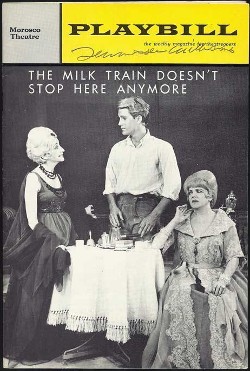Production history
Its first American production was in January 1963 on Broadway at the Morosco Theatre, starring Hermione Baddeley and produced by Roger Stevens. [3] [4] Reviews of the play were poor, although a newspaper strike prevented them from reaching audiences; the play ran for only 69 performances. Noël Coward saw a production and said "I found it so intolerable and Hermione Baddeley’s acting so vulgar that I left after about twenty minutes and went home." [5]
Williams revised the script for a second production, giving it a kabuki framework, with two actors playing stagehands who comment on the play as it happens. This new production was produced by David Merrick. It opened on January 1, 1964 at the Brooks Atkinson Theatre under the direction of Tony Richardson. [6] It starred Tallulah Bankhead (the part had originally been written for and was loosely based on Bankhead) and Tab Hunter, with Marian Seldes.
Richardson said " I loved doing a new play, especially an American play. I was flattered to be asked, and already thought of becoming a hero by creating success out of failure." [7]
Williams and Merrick wanted Bankhead and Richardson would only agree if they agreed to Tab Hunter in the male lead. Williams was reluctant "since I could not see in Tab a mystic and ambiguous quality which the part demanded" but Richardson said he had a "moral obligation" to Hunter. "I can only surmise what the "moral obligation" may have been, and I shall leave you in the same uncertainty," wrote Williams. [8] Williams later wrote Hunter "showed more talent than I would have expected, but an ambivalent mysticism was not so apparent in his performance as a lingering talent for exposing his skin and physique." [9]
Hunter said he was recommended by the first choice for the role, Anthony Perkins, who was unable to do the play. Hunter found working with Bankhead difficult, saying "What pissed me off was Tallulah's complete lack of professionalism, her inability to see beyond herself, beyond her reputation. She was dissipating an incredible God-given talent, especially when she'd decide to turn anything — anything — into high camp." [10]
It ran for only five performances after again receiving very poor notices. The 2011 revival starring Olympia Dukakis was directed by Michael Wilson. [11]
In 1968, the play was adapted by Williams into the film Boom! , co-starring Elizabeth Taylor and Richard Burton, and directed by Joseph Losey. The film was a disastrous vehicle for both stars.
Williams later wrote "If you write a play with a very strong female role, such as Flora Goforth of The Milk Train Doesn't Stop Here Anymore, it is likely to surface repeatedly, since female stars of a certain age have a rough time finding vehicles suitable to their talents, personalities, and their public images." [12]
In 1987, the play was revived at WPA Theatre in New York City. [13]
Synopsis
The play is set in Italy and centers on a dying, wealthy woman, Mrs. Flora Goforth, who catches a young man, Christopher Flanders, allegedly trespassing on her estate. Dialogue between the two makes up much of the play. As a character, Mrs. Goforth is in a position where under the traditions of classic drama she could be a Stoic, but she deliberately rejects the consolations of philosophy and chooses, instead, to affirm eroticism and mysticism. Mrs. Goforth dies at the end of the play after making these affirmations as her definitive statement about Life. [14]
This page is based on this
Wikipedia article Text is available under the
CC BY-SA 4.0 license; additional terms may apply.
Images, videos and audio are available under their respective licenses.
